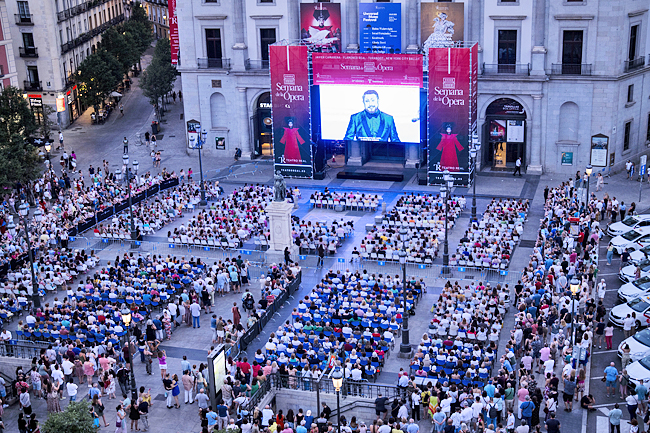MADRID (AP) – On a night in the middle of July, tenors, sopranos and a choir delighted the crowd in Madrid’s luxurious Teatro Real opera house with Giacomo Puccini’s masterpiece, Turandot.
After the curtain came down, the audience filed from their plush seats and left the theatre’s state-of-the-art air conditioning for the summer swelter outside – only to be met again by the voices of Calaf and Princess Turandot.
The performance they had just seen was being replayed on a giant television screen in the big square at the back of the theatre.
Here, the spectators sat on hundreds of plastic chairs. Many wore shorts and sandals. Others, tourists included, sat on the low walls and benches in the square or leaned on the barriers and the nearby subway station’s railings.
Some chewed on rolls of Spanish jam, others played cards. But most were absorbed with the show on the nine-by-five-metre screen.
The night was part of Teatro Real’s “opera week”, which for eight years has been providing a free broadcast of an opera in the theatre to towns and cities across Spain.

More than 100 towns displayed the broadcast of the July 14 Turandot performance. All the towns need is a computer, a good Wi-Fi connection and somewhere to project the video.
During the week, the crowds outside the theatre in Madrid also got to see other Teatro Real shows, including a ballet and flamenco act. The week cost the theatre EUR107,000.
The chief aim is to spread interest in opera.
Opera “is popular music, it was always the total art where literature, music and dance met, (when) there was no television, there was no radio”, said Spanish tenor Jorge de León, who played Calaf.
“We have to remove that label of elitism that opera has, because they (operas) talk about stories, about very understandable things,” he said, sitting on one of the plastic chairs among the spectators in the square.
In Mino de San Esteban, a village of 44 inhabitants, 94-year-old Nemesia Olmos soaked up the projection of Turandot on the wall of the town’s church.
Cultural life in the village has changed greatly. Gone is the crowded ballroom and visits from travelling theatre groups. No longer do residents listen to songs from what was the only radio in the village. For the villagers, the Teatro Real’s offering is a delight.






